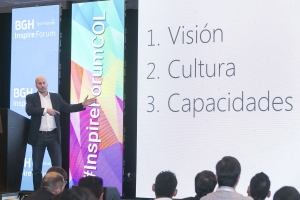The Digital Dilemma for “Traditional” Business

In the title of this post, you’ll notice that I put the word “traditional” in quotes. The reason for this is that I subscribe to the notion that, within the decade, it will be clear that “traditional” business or businesses that don’t have software (and data) at their core, will start to become the exception rather than the norm. This is a theme that I’ve been communicating through a number of public presentations that I’ve done lately on Digital Transformation.
I haven’t been this convinced (and gung-ho) about technology’s central role in the world economy since I was very young and naive (translation: a long time ago). Some may say I’m still naive for thinking this way again, but there are some very real reasons for holding this perspective. The newspaper, music, telecommunication and, now, retail industries have felt the sharp whip of digital disruption in the past and, some would say, have never recovered. Industries such as that of financial services, education and even healthcare are now feeling the snap of that same whip threatening them. By the way, an internal analysis done by the New York Times was leaked today on the net.
 We’re further along a curve of technological development that continues to climb ever steeper. As it climbs, once pie-in-the-sky technologies such as Artificial Intelligence (AI), Machine Learning (ML) are production ready and maturing at an accelerated pace.
We’re further along a curve of technological development that continues to climb ever steeper. As it climbs, once pie-in-the-sky technologies such as Artificial Intelligence (AI), Machine Learning (ML) are production ready and maturing at an accelerated pace.
What I believe businesses don’t realize (judging from their actions and not their words) is that this pace of change is accelerating and becoming more intense. As some propose, it’s possible that we’re approaching “the singularity” where the technology we create, itself, creates new technologies. This is actually already happening as some algorithms created by machine learning are incomprehensible to humans.
In my opinion, companies and even countries can see this period as either: 1. A frightening time or 2. One of the biggest opportunities to leapfrog into a more advanced and opportunity-ridden position. By embracing this change (e.g., better education opportunities, increased connectedness, better infrastructure, etc.), I do believe that countries could start transitioning their economies to economies of abundance instead of economies of scarcity.
 With respect to businesses, I envision an economic environment a decade out where interconnected platforms will start to become core to most company strategies. In the past, I’ve spoken of a new “intelligence” layer to the internet that interconnects individuals, but more importantly, devices and companies. In such a world, the Application Programming Interface (API) becomes just as important as User Experience (UX) if not more so.
With respect to businesses, I envision an economic environment a decade out where interconnected platforms will start to become core to most company strategies. In the past, I’ve spoken of a new “intelligence” layer to the internet that interconnects individuals, but more importantly, devices and companies. In such a world, the Application Programming Interface (API) becomes just as important as User Experience (UX) if not more so.
I do believe that large companies in emerging companies are at an advantage in terms of the amount of time they have to transform and the reason for transforming. Emerging markets are environments where capital scarcity and wealth distribution issues give established players some advantages and blunt the impact of technological change.
 Nonetheless, these industries are not immune to outside threats as the local newspaper, taxi and media industries have found out. For example, it’s possible that large financial institutions still have some natural barriers to entry that new fintech players may find difficult to overcome.
Nonetheless, these industries are not immune to outside threats as the local newspaper, taxi and media industries have found out. For example, it’s possible that large financial institutions still have some natural barriers to entry that new fintech players may find difficult to overcome.
Nonetheless, this will not prevent large internet companies such as Facebook from disrupting them. Even worse, if cryptocurrencies start to take hold in a much bigger way, the balance of power may be tipped even more. I believe that things will accelerate even more if we experience a financial crisis (e.g., currency, bonds, etc.) similar or worse than the one experienced in 2008.
Nonetheless, the biggest challenge will be people-related. How do “transformed” companies need to get their work done, how do they need to treat their people, how do they need attract talent, how do ideas get implemented? In other words, I firmly believe that Digital Transformation is the biggest leadership challenge of the coming decades.
Finally, below, I’m including an interesting video (in Spanish) of a panel that I was on in Mexico City on banks and fintech a few months ago when I was working on an acquisition for BBVA of a Mexican startup called Openpay, but I was not at liberty to say this as the acquisition was still a month away from closing. It is interesting because one of the investors on the panel (around the middle of the video), who’s also a friend, mentions that it does not seem plausible that a bank would acquire a startup in Latin America in the short term(I don’t think any bank had done this previously and I’m sure many would have agreed with this premise). Change sometimes happens more quickly than we think. 
